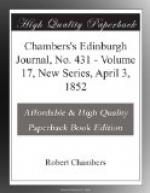Landsmen! do you now envy and begrudge a living to the poor blue-jackets, who risk limb and life to carry on your commerce with the uttermost ends of the earth, and who man the wooden walls that alone render Britain the invincible mistress of the world? Ladies! dear, tender-hearted ladies! do you feel indifferent to the hard lot of the gallant fellows who sail the trackless ocean to supply you with silks and diamonds, with sugar and tea, and every conceivable luxury of dress and food? Be kind, we implore you, to Poor Jack, wherever you meet him, for he would shed the last drop of blood in his veins to defend you! Make every Christian allowance for his follies and his sins when ashore. Do all you can—and we think you might do much if you would—to ameliorate his physical condition, and you will improve his moral one at the same time. For ourselves, we can only say that we ever shall own Poor Jack as a messmate and a brother, and while we have a shot in the locker, he shall freely share it, God help him!
INFLUENCE OF EXAMPLE.
In a certain village in Switzerland, some years ago, there were heavy complaints among all who possessed trees, that no fruit was safe; that the children plundered it perpetually before it came to maturity; and not only that, but that the green saplings had no security against them. Another serious complaint was the barbarity of the children towards all living creatures in their power. The clergyman, teacher, and elders, often laid their heads together, to find some remedy for this inhuman spirit, by which every child in the place was more or less affected. They could not conceive why such a spirit should prevail so specially in this village; but they could find neither cause nor remedy: all exhortations, all punishments, were in vain. The clergyman of the village was changed; and the new minister was a great friend to schools. His first walk was to the school-house. The vice of the scholars had been made known to him, and the failure of all preventive measures hitherto applied. But, determining within himself to watch the whole course of proceedings in school, he soon perceived that the teacher had a habit, and had acquired a singular dexterity in it, of knocking down and killing flies with his cane, to the end of which he had fastened a piece of leather. The windows were all on one side, and being exposed to the morning sun of summer, they were continually full of flies. The teacher’s path lay along them, in front of his scholars; and while talking to the latter, he struck down the flies as they shewed themselves at the window. This manoeuvre amused the children infinitely more than his instruction did, and they followed his example. They were incessantly on the watch for flies that buzzed through the room, caught them in their hands, and shewed as great dexterity in this kind of chase as their teacher in his. But their amusement did not end here: they had learned to play with their captives, treat them with detestable cruelty, and seemed to find a wicked delight in observing the shivering of their victims.




